What do you do if your PC starts rebooting spontaneously? There are many reasons for this – both software and hardware. Let’s look at the most common cases. 10 Reasons Why Your PC Restarts On Its Own
Problems with the motherboard

The motherboard is the heart of your computer, and its stable operation depends on it. Malfunctions in this component can cause many problems, including cyclic reboots. What can go wrong with the motherboard?
- Southbridge. This chip controls all ports on the back of the PC. Its overheating leads to crashes and reboots. The solution is to replace the thermal paste or install an active fan.
- Southbridge. This chip controls all ports on the back of the PC. Its overheating leads to crashes and reboots. The solution is to replace the thermal paste or install an active fan. Northbridge. In modern PCs, it is responsible for communication between the processor, video card, and RAM. Problems with it manifest themselves similarly to issues with the southbridge.
- BIOS chip. Stores data about devices connected to the computer. Reboots can occur due to unsuccessful BIOS flashing, a discharged battery, or damaged tracks on the motherboard.
- Capacitors. These elements accumulate and release an electric charge. Swelling or exploding capacitors lead to unstable power supply, which causes reboots and short circuits. Solution: replace damaged capacitors with new ones.
Tracks and pads. Due to their small size, they are easily damaged. If a pad shorts, the PC needs to be assembled correctly. Ensure the board does not directly contact the case but uses dielectric spacers. .
Problems with the processor
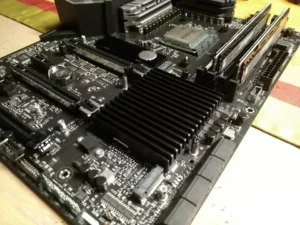
The critical problem in the processor’s operation may be overheating. The optimal temperature for single-core processors is 30-40 °C, and for multi-core processors, up to 130 °C. Anything higher can cause the PC to shut down and reboot. But there are other pitfalls.
- Inefficient cooling system. The cooling system must maintain an average processor temperature. If it fails, the processor overheats and fails, manifested by frequent freezes and reboots—
- Abnormal operating mode. Overclocking the processor increases its performance but also increases the temperature, which can lead to the destruction of the processor core, causing instability in the system.
Video card malfunctions

Here we see a similar picture, where a malfunction of one or another component leads to an involuntary reboot of the PC.
- PCI-Express connector issues. Dust between the contacts can cause interruptions and reboots, which are
- breakdowns in power supply circuits. In this case, the video card may not turn on, and the BIOS signals an error—
- driver failure. Remove old video card drivers and install the latest software from the manufacturer’s official website.
- Bad BIOS firmware. This is especially true for video cards used in mining. Check and restore the factory BIOS firmware.
RAM problems
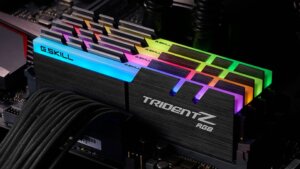
What problems can be expected here?
- RAM incompatibility . Using memory modules from different manufacturers with different characteristics can cause conflicts. It is better to use modules from the same manufacturer and series.
- Inability to work in dual-channel mode . Not all RAM modules support this mode.
- Unsuccessful overclocking . Exceeding the permissible voltage during overclocking can burn out the memory module.
SSD Problems
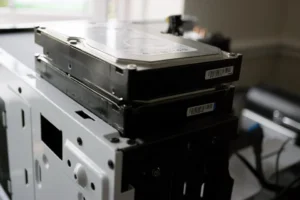
The fault may lie between the interface and the memory chips in the SSD controller. Damage to this area may lead to data loss. In this case, updating the drive firmware is recommended.
Faulty power supply

What pitfalls await the user here?
- Insufficient power : If the power supply does not provide enough power for the entire system, it may overheat and cause reboots.
- Dried out or swollen capacitors . This can happen due to long-term use or overheating.
- Lack of protection . Cheap power supplies may not have protection against short circuits and voltage surges, which can cause serious damage. It is recommended to choose power supplies with an 80 Plus certificate.
Note: For top-quality gaming accessories and PC gear—including controllers, chairs, mice, keyboards, headsets, and Xbox One accessories—visit FMJBiz to upgrade your setup today.
BIOS issues
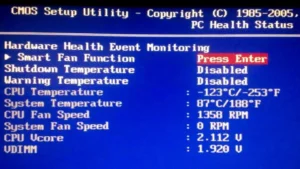
Not everyone wants to look for the causes of reboot problems in the BIOS, but they are there, too.
- Mismatch between the BIOS version and components . For example, a motherboard on the B350 chipset supports second-generation Ryzen processors only after updating the BIOS.
- Overclocked components . This can lead to overheating and permanent reboots.
- Errors during update . BIOS may be updated with errors or downloaded from an unverified source, which makes its operation unstable.
Bad assembly

The low competence of the specialist assembling a new PC is another destructive scenario. For example, the motherboard may be pressed against the case due to improper assembly. And poor soldering in contact with metal can lead to a short circuit. 10 Reasons Why Your PC Restarts On Its Own
Problems with autoloading

Why should you install programs from trusted sources? Because from untrusted sources, under the guise of regular software, a bunch of digital “weeds” can crawl out. For example:
- Mining programs;
- Optimizers;
- Banners;
- Advertising links.
The software mentioned above will clutter the OS startup parameters, and often, such software needs to be displayed in the task manager. Despite this, the programs take up the PC’s resources and sometimes even reboot it.
Problematic OS installation and presence of viruses
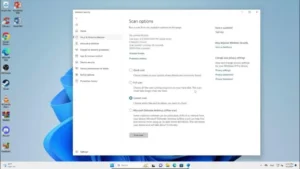
The most reliable preventive measure is to create a system restore point. It is advisable to do this at least once a month. This way, you can “roll back” the OS to a stable version.10 Reasons Why Your PC Restarts On Its Own
Also Read: Windows 10 Safe Mode
Also Read: Best Webcam Video Recording Software


